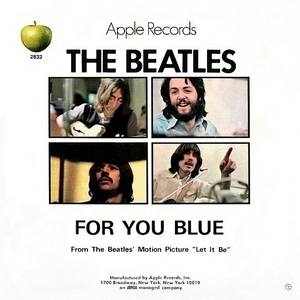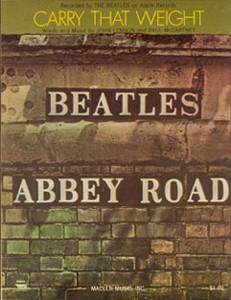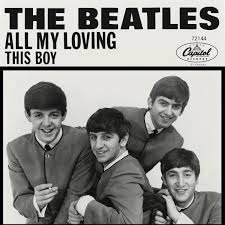Related Research Articles

George Harrison was an English musician, singer-songwriter, and music and film producer who achieved international fame as the lead guitarist of the Beatles. Sometimes called "the quiet Beatle", Harrison embraced Indian culture and helped broaden the scope of popular music through his incorporation of Indian instrumentation and Hindu-aligned spirituality in the Beatles' work. Although the majority of the band's songs were written by John Lennon and Paul McCartney, most Beatles albums from 1965 onwards contained at least two Harrison compositions. His songs for the group include "Taxman", "Within You Without You", "While My Guitar Gently Weeps", "Here Comes the Sun" and "Something".

The Beatles were an English rock band formed in Liverpool in 1960. With a line-up comprising John Lennon, Paul McCartney, George Harrison and Ringo Starr, they are regarded as the most influential band of all time and were integral to the development of 1960s counterculture and popular music's recognition as an art form. Rooted in skiffle, beat and 1950s rock and roll, their sound incorporated elements of classical music and traditional pop in innovative ways; the band later explored music styles ranging from ballads and Indian music to psychedelia and hard rock. As pioneers in recording, songwriting and artistic presentation, the Beatles revolutionised many aspects of the music industry and were often publicised as leaders of the era's youth and sociocultural movements.

"For No One" is a song by the English rock band the Beatles from their 1966 album Revolver. It was written by Paul McCartney, and credited to Lennon–McCartney. A blend of baroque pop and chamber music, the song is about the end of a relationship, and was one of McCartney's most mature and poignant works upon its release. Mostly performed by the composer, the track is distinguished by its French horn solo, performed by Alan Civil and used as counterpoint in the final verse.

Abbey Road is the eleventh studio album by the English rock band the Beatles, released on 26 September 1969 by Apple Records. Named after Abbey Road, London, the location of EMI Studios, the cover features the group walking across the street's zebra crossing, an image that became one of the most famous and imitated in popular music. The album's initially mixed reviews were contrasted by its immediate commercial success, topping record charts in the UK and US. The single "Something" / "Come Together" was released in October and topped the US charts.

"For You Blue" is a song by the English rock band the Beatles from their 1970 album Let It Be. The track was written by George Harrison as a love song to his wife, Pattie Boyd. It was also the B-side to the "Long and Winding Road" single, issued in many countries, but not Britain, and was listed with that song when the single topped the US Billboard Hot 100 and Canada's national chart in June 1970. On the Cash Box Top 100 chart, which measured the US performance of single sides individually, "For You Blue" peaked at number 71.

"You Never Give Me Your Money" is a song by the English rock band the Beatles. It was written by Paul McCartney and documented the financial and personal difficulties facing the band. The song is the first part of the medley on side two of their 1969 album Abbey Road and was recorded in stages between May and August that year.

"Carry That Weight" is a song by the English rock band the Beatles from their 1969 album Abbey Road. Written by Paul McCartney and credited to Lennon–McCartney, it is the seventh and penultimate song in the album's climactic side-two medley. It features unison vocals in the chorus from all four Beatles, a rarity in their songs. It is preceded by "Golden Slumbers" and segues into "The End".

"Martha My Dear" is a song by the English rock band the Beatles from their 1968 eponymous double album The Beatles. Credited to Lennon–McCartney, the song was written solely by Paul McCartney about his Old English Sheepdog, Martha. It has been covered by several artists, including Slade, Herb Alpert & The Tijuana Brass, Phish, World Party, and Les Boréades de Montréal.

"Lovely Rita" is a song by the English rock band the Beatles from their 1967 album Sgt. Pepper's Lonely Hearts Club Band. It was written and sung by Paul McCartney and credited to Lennon–McCartney. It is about a female traffic warden and the narrator's affection for her.

"You're Going to Lose That Girl" is a song by the English rock band the Beatles from their 1965 album and film Help! Credited to the Lennon–McCartney songwriting partnership, the song was mostly written by John Lennon with contributions from Paul McCartney.

"All My Loving" is a song by the English rock band the Beatles, from their second UK album With the Beatles (1963). It was written by Paul McCartney for his partner Lydia Kelly, and produced by George Martin. Though not officially released as a single in the United Kingdom or the United States, the song drew considerable radio airplay, prompting EMI to issue it as the title track of an EP. The song was released as a single in Canada, where it became a number one hit. The Canadian single was imported into the US in enough quantities to peak at number 45 on the US Billboard Hot 100 in April 1964.

"Don't Bother Me" is a song by the English rock band the Beatles from their 1963 UK album With the Beatles. It was the first song written by George Harrison, the group's lead guitarist, to appear on one of their albums. An uptempo rock and roll song, it was originally released in the United States on the 1964 album Meet the Beatles!

"Hey Bulldog" is a song by the English rock band the Beatles released on their 1969 soundtrack album Yellow Submarine. Credited to Lennon–McCartney, but written primarily by John Lennon, it was finished in the recording studio by both Lennon and Paul McCartney. The song was recorded during the filming of the "Lady Madonna" promotional film, and, with "Lady Madonna", is one of the few Beatles songs based on a piano riff.

"Only a Northern Song" is a song by the English rock band the Beatles from their 1969 soundtrack album Yellow Submarine. Written by George Harrison, it was the first of four songs the band provided for the 1968 animated film Yellow Submarine, to meet their contractual obligations to United Artists. The song was recorded mainly in February 1967, during the sessions for Sgt. Pepper's Lonely Hearts Club Band, but the Beatles chose not to include it on that album. The group completed the recording two months later, straight after finishing work on Sgt. Pepper.

"Old Brown Shoe" is a song by the English rock band the Beatles. Written by George Harrison, the group's lead guitarist, it was released on a non-album single in May 1969, as the B-side to "The Ballad of John and Yoko". The song was subsequently included on the band's compilation albums Hey Jude, 1967–1970 and Past Masters, Volume Two. Although "Old Brown Shoe" remains a relatively obscure song in the band's catalogue, several music critics view it as one of Harrison's best compositions from the Beatles era and especially admire his guitar solo on the track.
"Not Guilty" is a song by English rock musician George Harrison from his 1979 album George Harrison. He wrote the song in 1968 following the Beatles' Transcendental Meditation course in India with Maharishi Mahesh Yogi, an activity that he had led the group in undertaking. The lyrics serve as a response to the recrimination Harrison received from his bandmates John Lennon and Paul McCartney in the aftermath to the group's public falling out with the Maharishi, and as the Beatles launched their multimedia company Apple Corps. The band recorded the song amid the tensions that characterised the sessions for their 1968 double LP The Beatles. The track was completed in August 1968 but not included on the release.
Northern Songs Ltd was a limited company founded in 1963, by music publisher Dick James, artist manager Brian Epstein, and songwriters John Lennon and Paul McCartney of the Beatles, to publish songs written by Lennon and McCartney. In 1965, it was decided to make Northern Songs a public company, to reduce their income tax burden.

From August 1962 to September 1969, the Beatles had a lineup that consisted of John Lennon, Paul McCartney, George Harrison and Ringo Starr. Their break-up was a cumulative process attributed to numerous factors. These include the strain of the Beatlemania phenomenon, the death of manager Brian Epstein in 1967, resentment towards McCartney from his bandmates for his perceived domineering role, Lennon's heroin use and his relationship with Yoko Ono, Harrison's prolific songwriting output, the floundering of Apple Corps and the Get Back project as well as managerial disputes.

"In Spite of All the Danger" is the first song recorded by the Quarrymen, then consisting of John Lennon, Paul McCartney, George Harrison, pianist John Lowe, and drummer Colin Hanton.
Startling Music Ltd. is a music publishing company, founded in 1968 by singer, songwriter and musician Ringo Starr, drummer of the Beatles.
References
- ↑ Harry, Bill (2003). The George Harrison Encyclopedia. London: Virgin Books. p. 56. ISBN 978-0-7535-0822-0.
- ↑ Loker, Bradford E. (2009). History with the Beatles. Indianapolis, IN: Dog Ear Publishing. p. 173. ISBN 978-1-60844-0399.
- ↑ MacDonald, Ian (1998). Revolution in the Head: The Beatles' Records and the Sixties. London: Pimlico. p. 209. ISBN 978-0-7126-6697-8.
- ↑ Miles, Barry (2001). The Beatles Diary Volume 1: The Beatles Years. London: Omnibus Press. p. 314. ISBN 0-7119-8308-9.
- ↑ Madinger, Chip; Easter, Mark (2000). Eight Arms to Hold You: The Solo Beatles Compendium. Chesterfield, MO: 44.1 Productions. p. 420. ISBN 0-615-11724-4.
- ↑ Harrison, George (2002). I, Me, Mine. San Francisco, CA: Chronicle Books. pp. 385–86. ISBN 978-0-8118-5900-4.
- ↑ Clayson, Alan (2003). George Harrison. London: Sanctuary. pp. 284–85. ISBN 1-86074-489-3.
- 1 2 Lewisohn, Mark (2003). "Something Else". Mojo: The Beatles' Final Years Special Edition. London: Emap. p. 118.
- ↑ "Concord's Bicycle Music signs global George Harrison publishing deal". Musicbusinessworldwide.com. 6 January 2016. Retrieved 3 September 2020.